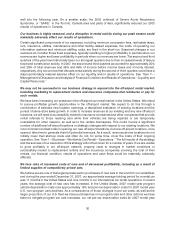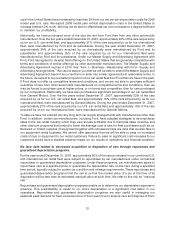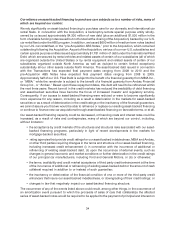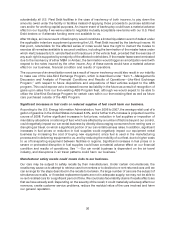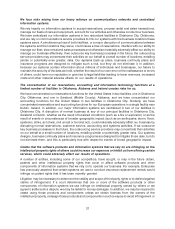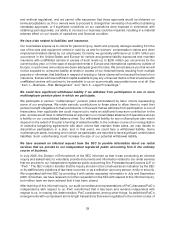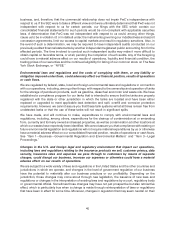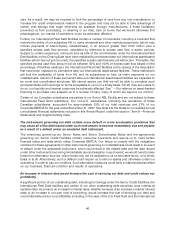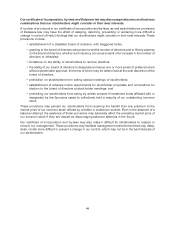Hertz 2007 Annual Report Download - page 60
Download and view the complete annual report
Please find page 60 of the 2007 Hertz annual report below. You can navigate through the pages in the report by either clicking on the pages listed below, or by using the keyword search tool below to find specific information within the annual report.business, and, therefore, that the commercial relationship does not impair PwC’s independence with
respect to us. If the SEC were to take a different view and it were ultimately determined that PwC was not
independent with respect to us for certain periods, our filings with the SEC which contain our
consolidated financial statements for such periods would be non-compliant with applicable securities
laws. A determination that PwC was not independent with respect to us could, among other things,
cause us to be in violation of, or in default under, the instruments governing our indebtedness and airport
concession agreements, limit our access to capital markets and result in regulatory sanctions. Also, in
the event of such a determination, we may be required to have independent audits conducted on our
previously audited financial statements by another independent registered public accounting firm for the
affected periods. The time involved to conduct such independent audits may make it more difficult to
obtain capital on favorable terms, or at all, pending the completion of such audits. Any of the foregoing
could have a material adverse effect on our results of operations, liquidity and financial condition, the
trading prices of our securities and the continued eligibility for listing of our common stock on The New
York Stock Exchange, or ‘‘NYSE.’’
Environmental laws and regulations and the costs of complying with them, or any liability or
obligation imposed under them, could adversely affect our financial position, results of operations
or cash flows.
We are regulated by federal, state, local and foreign environmental laws and regulations in connection
with our operations, including, among other things, with respect to the ownership and operation of tanks
for the storage of petroleum products, such as gasoline, diesel fuel and motor and waste oils. We have
established a compliance program for our tanks that is intended to ensure that the tanks are properly
registered with the state or other jurisdiction in which the tanks are located and have been either
replaced or upgraded to meet applicable leak detection and spill, overfill and corrosion protection
requirements. However, we cannot assure you that these tank systems will at all times remain free from
undetected leaks or that the use of these tanks will not result in significant spills.
We have made, and will continue to make, expenditures to comply with environmental laws and
regulations, including, among others, expenditures for the cleanup of contamination at or emanating
from, currently and formerly owned and leased properties, as well as contamination at other locations at
which our wastes have reportedly been identified. We cannot assure you that compliance with existing or
future environmental legislation and regulations will not require material expenditures by us or otherwise
have a material adverse effect on our consolidated financial position, results of operations or cash flows.
See ‘‘Item 1—Business—Governmental Regulation and Environmental Matters’’ and ‘‘Item 3—Legal
Proceedings.’’
Changes in the U.S. and foreign legal and regulatory environment that impact our operations,
including laws and regulations relating to the insurance products we sell, customer privacy, data
security, insurance rates and expenses we pass through to customers by means of separate
charges, could disrupt our business, increase our expenses or otherwise could have a material
adverse effect on our results of operations.
We are subject to a wide variety of laws and regulations in the United States and the other countries and
jurisdictions in which we operate, and changes in the level of government regulation of our business
have the potential to materially alter our business practices or our profitability. Depending on the
jurisdiction, those changes may come about through new legislation, the issuance of new laws and
regulations or changes in the interpretation of existing laws and regulations by a court, regulatory body
or governmental official. Sometimes those changes may have not just prospective but also retroactive
effect, which is particularly true when a change is made through reinterpretation of laws or regulations
that have been in effect for some time. Moreover, changes in regulation that may seem neutral on their
40


